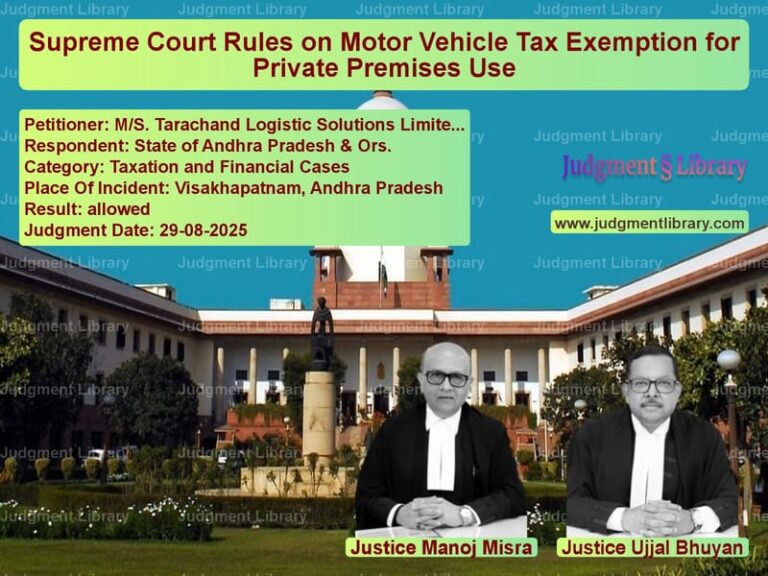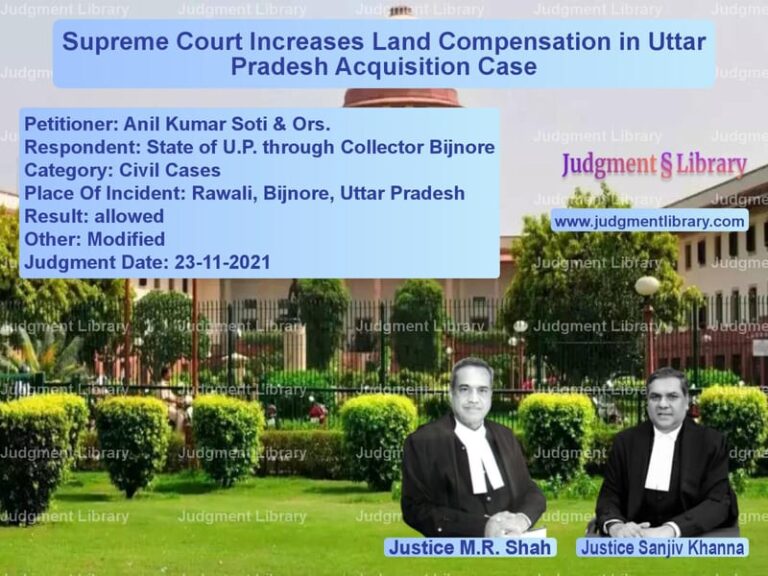Validity of No Confidence Motion: Supreme Court Rules on Panchayat Elections in Uttar Pradesh
The Supreme Court of India recently ruled on a significant case concerning the validity of a no-confidence motion against the Pramukh of a Kshettra Panchayat in Uttar Pradesh. The case, Ram Pal Singh v. State of U.P. & Ors., revolved around whether elected members of the Kshettra Panchayat who had not taken the oath of office could sign a no-confidence motion. The Court ultimately upheld the motion and dismissed the petition challenging it.
Background of the Case
The case stemmed from the election of members to the Kshettra Panchayat in Jasrana, District Ferozabad, Uttar Pradesh, following a notification by the State Election Commission on September 21, 2015. Elections were held on February 7, 2016, and 63 candidates were declared elected. Subsequently, on March 18, 2016, the elected members convened, and the petitioner, Ram Pal Singh, was elected as the Pramukh (head) of the Panchayat.
Dispute Over Oath-Taking
One of the central disputes in the case was whether all elected members had taken the oath of office on March 18, 2016. The petitioner argued that 17 members had not taken the oath and, therefore, could not legally sign the no-confidence motion filed against him on June 12, 2017. The respondents, however, contended that all members had taken the oath and were eligible to participate in the motion.
Petitioner’s Arguments
- The petitioner claimed that 17 elected members had not taken the oath of office and, therefore, were not entitled to participate in the no-confidence motion.
- He cited a document dated March 28, 2016, issued by the Block Development Officer, Jasrana, which allegedly asked 17 members to take the oath on March 31, 2016.
- Since the motion was signed by 39 members, and if 13 of those signatories had not taken the oath, the motion would be invalid under Section 15 of the Uttar Pradesh Kshettra Panchayats and Zila Panchayats Adhiniyam, 1961 (Adhiniyam), which requires at least half the elected members to sign a no-confidence motion.
Respondents’ Arguments
- The State of Uttar Pradesh and contesting members argued that all 63 members had taken the oath on March 18, 2016.
- They presented official records, including attendance registers and reports from government officials, confirming that all members were sworn in on the said date.
- The document relied upon by the petitioner was not officially recorded, and there was no evidence that it had been dispatched or received by the 17 members in question.
- Even if a member had not taken the oath, they still retained their status as an “elected member” and were legally entitled to sign a no-confidence motion.
Supreme Court’s Observations
The Supreme Court extensively analyzed the provisions of the Adhiniyam and relevant case laws, making several key observations:
- “An elected member remains an elected member even if they have not taken the oath. The only restriction is that they cannot participate in Panchayat proceedings.”
- “The no-confidence motion process is distinct from legislative proceedings. Therefore, members who have not taken the oath can still sign such motions.”
- The Court rejected the petitioner’s claim that 17 members had not taken the oath, relying on official documents that confirmed otherwise.
- It ruled that the motion had the required support of more than half of the elected members, making it legally valid.
Key Legal Precedents Considered
- Bhupindra Nath Basu v. Ranajit Singh Bahadur (1914) – The Calcutta High Court ruled that failing to take the oath does not disqualify an elected member unless explicitly stated in law.
- Pashupati Nath Sukul v. Nem Chandra Jain (1984) – The Supreme Court ruled that an elected member who has not taken the oath can still perform “non-legislative functions,” such as proposing a Rajya Sabha candidate.
- Kamla Devi v. State of U.P. (2014) – The Allahabad High Court ruled that elected members who have not taken the oath can sign a no-confidence motion.
Final Judgment
The Supreme Court dismissed the petition filed by Ram Pal Singh and upheld the validity of the no-confidence motion. The Court stated:
“The 13 signatories to the no-confidence motion were elected members of the Kshettra Panchayat and were entitled to sign the motion. There was no infirmity in the process.”
The ruling reaffirmed that an elected member retains their status regardless of whether they have taken the oath, and there was no legal basis to disqualify them from initiating a no-confidence motion.
Significance of the Judgment
This judgment establishes several important legal principles:
- No-confidence motions are separate from legislative proceedings, and non-oath-taking members can participate in them.
- An elected member does not lose their status for failing to take the oath, unless explicitly stated in law.
- Judicial scrutiny of election processes must rely on official records rather than conflicting claims by political parties.
- The ruling clarifies the interpretation of Section 15 of the Adhiniyam, ensuring stability in Panchayat governance.
Conclusion
The Supreme Court’s ruling in this case strengthens democratic processes in local governance by ensuring that procedural technicalities do not override electoral mandates. By upholding the no-confidence motion, the Court reinforced the importance of following legal frameworks while preventing arbitrary disqualifications based on procedural disputes.
Petitioner Name: Ram Pal Singh.Respondent Name: State of Uttar Pradesh & Ors..Judgment By: Justice Madan B. Lokur, Justice Deepak Gupta.Place Of Incident: Jasrana, Ferozabad, Uttar Pradesh.Judgment Date: 23-04-2018.
Don’t miss out on the full details! Download the complete judgment in PDF format below and gain valuable insights instantly!
Download Judgment: Ram Pal Singh vs State of Uttar Prade Supreme Court of India Judgment Dated 23-04-2018.pdf
Direct Downlaod Judgment: Direct downlaod this Judgment
See all petitions in Public Interest Litigation
See all petitions in Legislative Powers
See all petitions in Fundamental Rights
See all petitions in Judgment by Madan B. Lokur
See all petitions in Judgment by Deepak Gupta
See all petitions in dismissed
See all petitions in supreme court of India judgments April 2018
See all petitions in 2018 judgments
See all posts in Election and Political Cases Category
See all allowed petitions in Election and Political Cases Category
See all Dismissed petitions in Election and Political Cases Category
See all partially allowed petitions in Election and Political Cases Category







